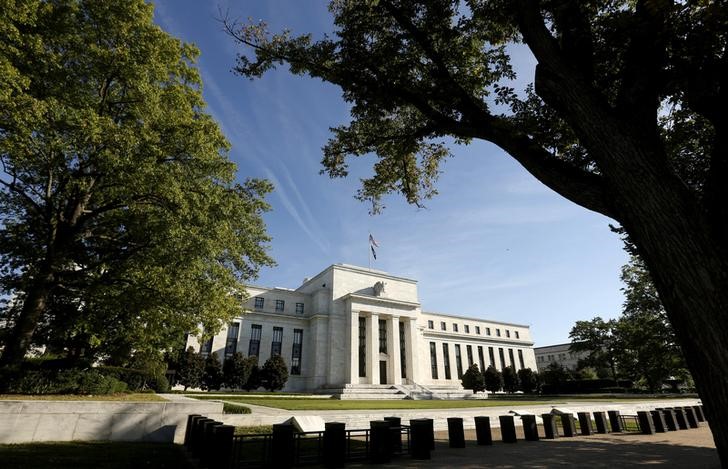By Michelle Price and Imani Moise
WASHINGTON (Reuters) - This year's Federal Reserve stress test results suggested a more flexible approach, a further sign the regulator's new leadership is responding positively to a Wall Street push for pragmatic bank supervision, analysts and lawyers said.
Banks that took a one-off capital hit due to the 2017 U.S. tax overhaul got a conditional pass, a departure from the Fed's traditional strict pass-fail approach to quantitative capital issues, while scandal-plagued Wells Fargo (NYSE:WFC) & Co was able to double share buyback plans.
Goldman Sachs (NYSE:GS) and Morgan Stanley (NYSE:MS) were dinged since their capital fell below the Fed's minimum, but the regulator's response this year sounded a more industry-friendly tone under Chairman Jerome Powell and Vice Chairman Randal Quarles, President Donald Trump appointees, analysts and lawyers said.
"They have allowed firms to pass on the basis there were special circumstances and applied a level of pragmatism in the way they haven't in the past. This is the new Fed and it signals to me an early retirement of this super-strict quantitative test," said Mike Alix, financial services risk leader at PwC.
The Fed on Thursday approved the capital plans of 34 lenders following the second leg of its annual tests, a process introduced after the 2007-2009 financial crisis to assess banks' capacity to withstand a severe recession. The U.S. central bank has ramped up its worst-case scenarios each year.
The U.S. tax code rewrite signed into law in December meant Goldman and Morgan Stanley's Thursday results were weighed, in part, by changes to the treatment of past losses on hypothetical tax bills under the Fed's scenarios.
But since the tax issue was a one-off and capital levels in the system are high, the Fed felt it was unnecessary to fail the two banks, senior Fed officials said.
Under the conditional approvals for their capital plans, the two banks can pay out capital distributions but must keep them in line with previous years.
Some analysts pointed to the Fed's conditional approval of State Street Corp's higher dividend even though its counterparty exposures showed high losses under the scenarios.
"This reinforces how the Federal Reserve was less draconian in how it reacted to the results," said Cowen Washington Research Group's Jaret Seiberg in a note.
Wells Fargo won approval for the highest payout ratio of the major U.S. banks, quashing investor concerns it would fail the part of the test measuring operational controls.
A passing grade could signal clearer skies ahead for Wells Fargo and better relations with regulators, according to analysts at Evercore Group LLC.
Democratic U.S. Senator Sherrod Brown on Thursday criticized bank payouts to “wealthy shareholders” and warned the Fed against easing up on how it approaches the tests.
STRESS BUFFER
Lenders have long complained the stress-test process is too opaque and that the Fed has been too harsh on firms whose results fall short of models the Fed keeps secret.
Despite noting the Fed's pragmatic stance on Goldman Sachs and Morgan Stanley, industry insiders still questioned whether the regulator should have proceeded with the tough scenarios this year given the short-term adverse tax changes, and said they want further changes to make the process more transparent.
Powell and Quarles have said they believe stress-testing can be more transparent and less discretionary, but banks continue to worry that Fed rule-easing may not go far enough or could inadvertently make life tougher if changes are not finely tuned.
They point, for example, to the Fed's April proposal to introduce a "stress capital buffer" that would work in tandem with the stress tests to move the system away from a strict annual quantitative pass-fail.
In a blog post published on Friday, bank trade group The Clearing House warned the proposal as written could actually exacerbate their capital planning challenges by requiring banks to capitalize themselves against stress losses year-round.

"This year’s results illustrate that capital requirements in the United States are highly volatile from year to year and that the volatility will be magnified by ... the stress buffer," they added.